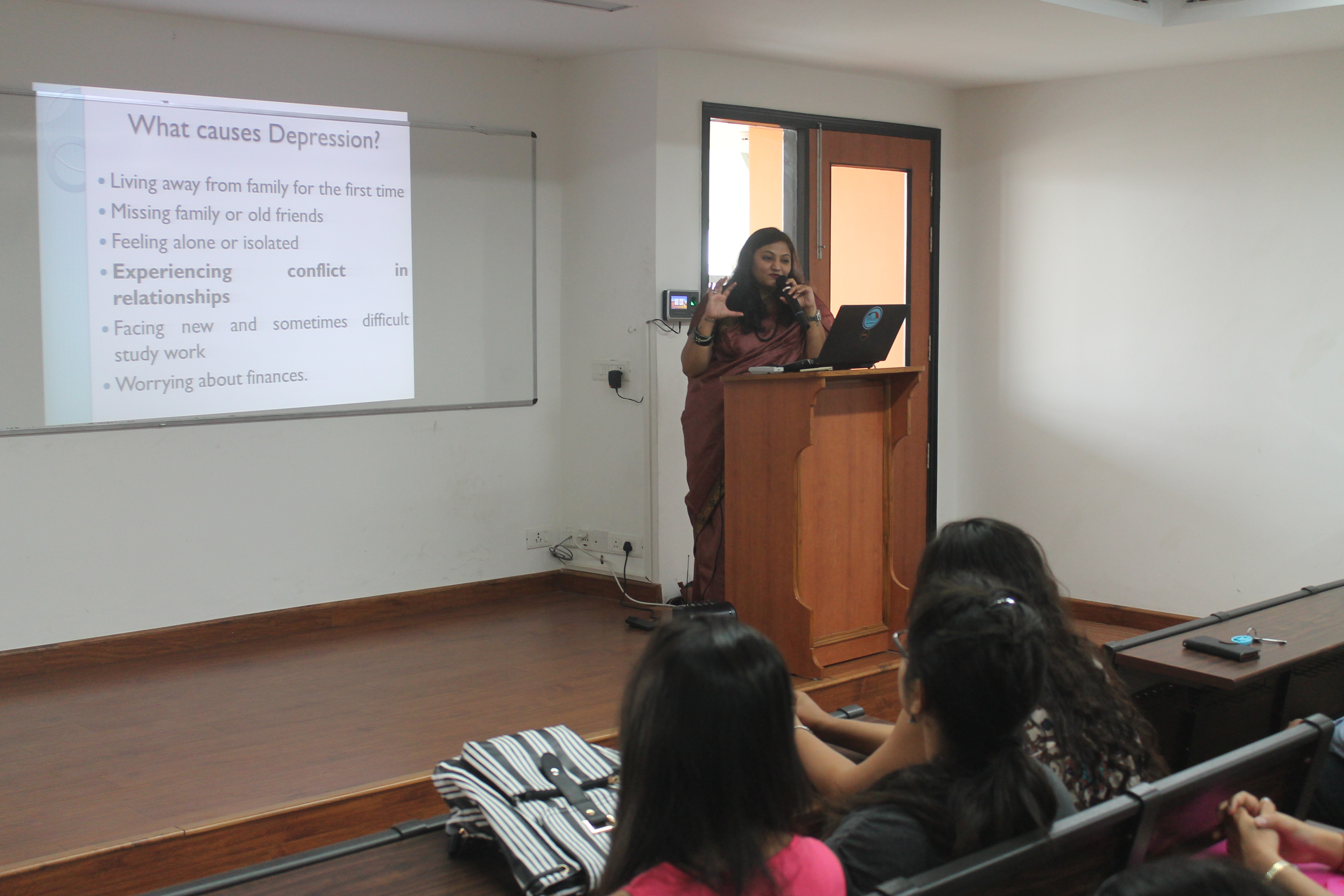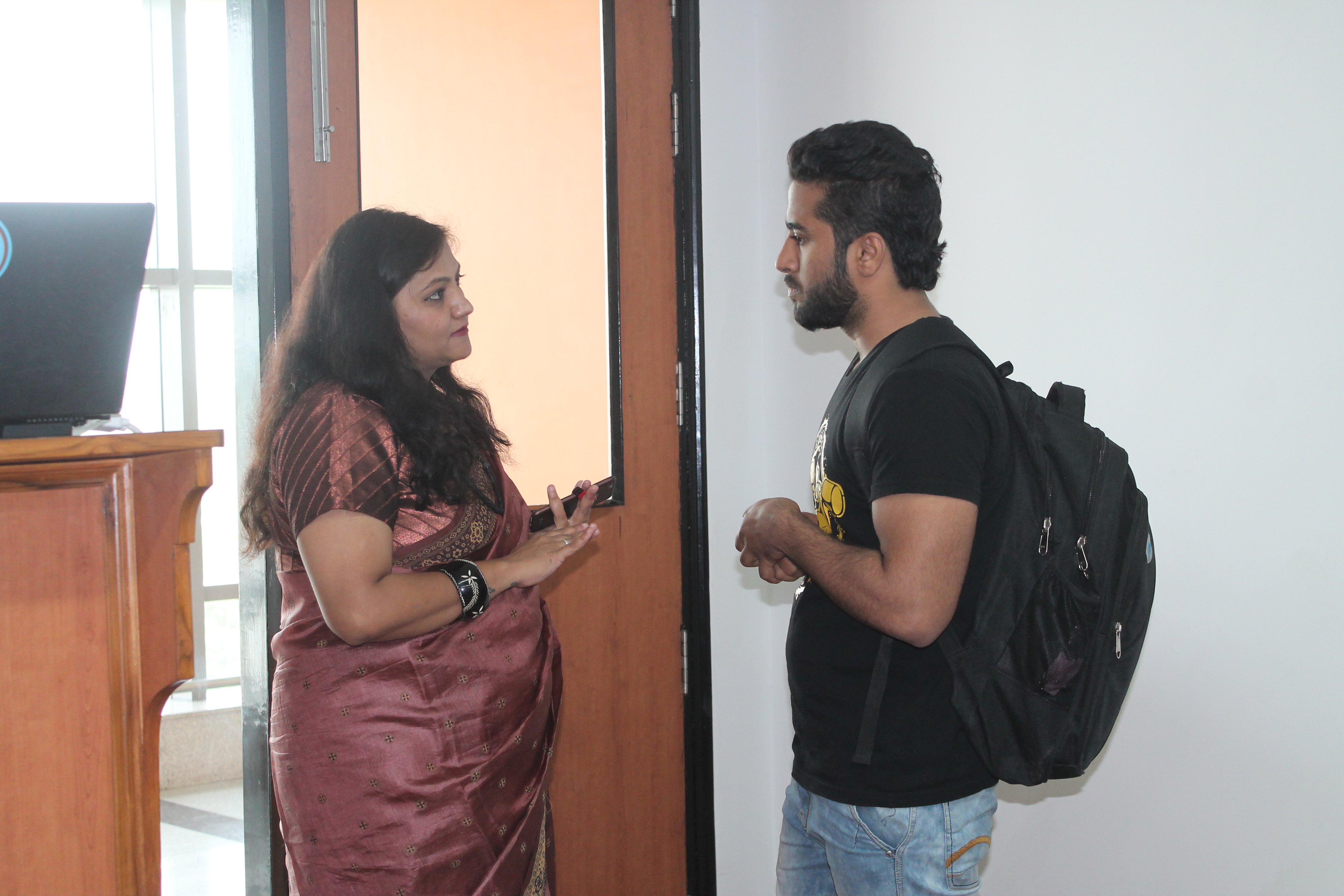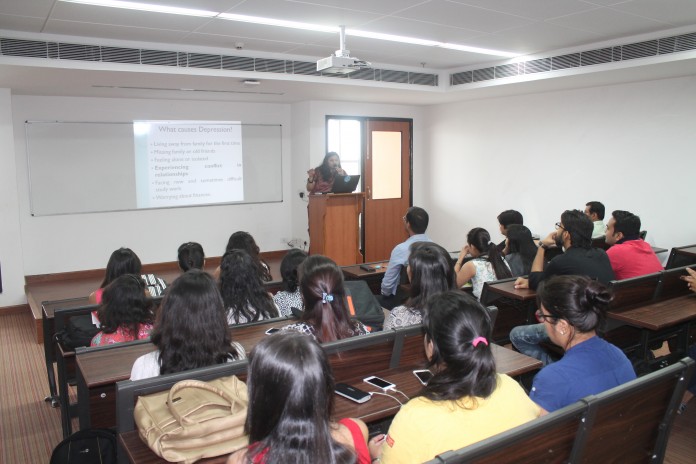On the occasion of World Health Day, The NorthCap University organized a talk on ‘depression’ in the university premises. It was conducted by Dr. Shweta Sharma, Psychologist, Columbia Asia Hospital. The aim was to define depression, risk factors, treatment options, self help, coping skills and how to help someone with depression.

Important Announcement – EasyShiksha has now started Online Internship Program “Ab India Sikhega Ghar Se”

Dr. Shweta Sharma, Psychologist, Columbia Asia Hospital said, “The most common problems in the present scenario are related to career options and relationship issues. It is very important to help yourself and then help others. Nowadays children are hesitant to discuss things with professionals so one of the most easy ways to tackle any depression issue is being a friend for a friend.”

Indraneel Banerjee, M.Tech student of the University said, “The session was very helpful and made me understand the importance of acceptance, accepting oneself and accepting other people. I was able to discuss my problems and learn about the ways to tackle it. The session was very fruitful and I thank the University for organizing such sessions.”
Top Courses in Software Engineering
The group therapy workshop focused on examining one’s beliefs towards themselves, the world and future and determining the change which was needed. Examples of irrational and self defeating feelings and ideas were also discussed.
An interactive session was held towards the end in which students came forward to share their problems. It involved audio visuals, stories, case studies, real life experiences, exercises and thought experiences.

The NorthCap University regularly organizes such workshops and has an in house psychologist Dr. Nikita Kapoor. Depression is a leading cause of ill health and disability worldwide, and effects people of all ages, from all walk walks of life, in every country. According to the latest estimates from WHO, more than 300 million people are now living with depression, an increase of more than 18 per cent between 2005 and 2015. Lack of support for people with mental disorders, coupled with a fear of stigma, prevent many from accessing the treatment they need to live healthy, productive lives.
Empower your team. Lead the industry
Get a subscription to a library of online courses and digital learning tools for your organization with EasyShiksha
Request NowQ. Are EasyShiksha's internships truly free?
Yes, all internships offered by EasyShiksha are completely free of charge.
Q. How can I apply for an internship with EasyShiksha?
You can apply by visiting our website, browsing available internships, and following the application instructions provided.
Q. What types of internships are available through EasyShiksha?
EasyShiksha offers a wide range of internships across technology, business, marketing, healthcare, and more. Opportunities are continuously updated.
Q. Will I receive a certificate upon completing an internship?
Yes, upon successful completion, you will receive a certificate recognizing your participation and achievements.
Q. Are EasyShiksha's internship certificates recognized by universities and employers?
Yes, the certificates are recognized by universities, colleges, and employers worldwide.
Q. Is the download of certificates free or paid?
Access to internships and courses is free, but there is a small fee to download certificates, covering administrative costs.
Q. When can I start the course?
You can choose any course and start immediately without delay.
Q. What are the course and session timings?
These are fully online courses. You can learn at any time and pace. We recommend following a routine, but it depends on your schedule.
Q. What will happen when my course is over?
After completion, you will have lifetime access to the course for future reference.
Q. Can I download the notes and study material?
Yes, you can access and download course materials and have lifetime access for future reference.
Q. What software/tools would be needed for the course?
All necessary software/tools will be shared during the training as needed.
Q. I’m unable to make a payment. What should I do?
Try using a different card or account. If the problem persists, email us at info@easyshiksha.com.
Q. Do I get the certificate in hard copy?
No, only a soft copy is provided, which can be downloaded and printed if required.
Q. The payment got deducted but shows “failed”. What to do?
Technical errors may cause this. The deducted amount will be returned to your account in 7-10 working days.
Q. Payment was successful but dashboard shows ‘Buy Now’?
Sometimes payment reflection is delayed. If it takes longer than 30 minutes, email info@easyshiksha.com with the payment screenshot.
Q. What is the refund policy?
If you face technical issues, you can request a refund. No refunds are issued once the certificate has been generated.
Q. Can I enroll in a single course?
Yes, select the course of interest, fill in the details, make payment, and start learning. You will also earn a certificate.
Q. My questions are not listed above. I need further help.
Contact us at info@easyshiksha.com for further assistance.
The overall goal of the campaign is that more people with depression, everywhere in the world, both seek and get help. In high-income countries, nearly 50% of people with depression do not get treatment. On average, just 3 per cent of government health budgets is invested in mental health, varying from less than 1 per cent in low-income countries to 5 per cent in high-income countries.
ALSO READ: iiit-delhi-hosts-india-korea-collaboration
Get Course: Understanding-Compliance-Cobit5-Principles



































































